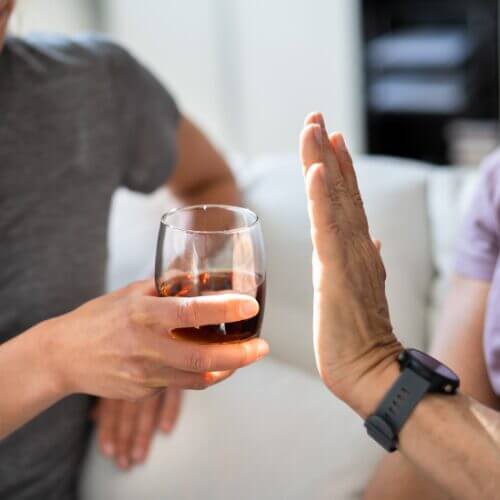Outpatient programming is available for those individuals who wish to remain at home during their treatment period instead of residing on campus. This allows someone the flexibility to remain engaged at work and to be able to continue fulfilling parenting obligations.
The partial hospitalization program (PHP) is the most intensive treatment available within an outpatient setting. The PHP, also referred to as day treatment, offers a comprehensive treatment approach for assisting individuals in overcoming a substance use disorder.
Because of the broad scope of the PHP, which includes 25-35 hours of weekly program participation, this form of outpatient treatment provides the highest standard of care next to a residential program.
What is a PHP?
The PHP is the most comprehensive of all the outpatient programs. These programs involve daily participation in a variety of evidence-based therapies, group sessions, classes, and complementary activities like yoga and art therapy. A PHP may provide detox services through an associated residential treatment center or a local detox center.
A PHP is often referred to as a day program. This is because there are therapeutic activities scheduled nearly every day of the week.
PHP treatment elements include:
Individual psychotherapy. Psychotherapy is essential to recovery for two primary reasons: 1) To break old thought patterns that have kept the person in a cycle of maladaptive behaviors, and 2) To identify underlying psychological issues, such as trauma, abuse, or a significant life event, that may have contributed to the substance use. Evidence-based therapies include:
- Cognitive Behavioral Therapy (CBT)
- Dialectical Behavior Therapy (DBT)
- Contingency Management
- Exposure Therapy
- Motivation Enhancement Therapy (MET)
Group therapy. Group therapy sessions are the centerpiece of outpatient treatment programs. The different types of groups include:
- Small groups where participants are encouraged to share their own struggles and personal stories under the guidance of a clinician. These groups provide peer support as group members bond over common experiences.
- Psychosocial education classes focus attention on the interpersonal relating and family related aspects of recovery. Recovery tools are taught, such as effective communication skills, conflict resolution, and stress reduction techniques.
- Family-focused groups help encourage family members to discuss and heal lingering resentments and to rebuild trust. They will learn how to avoid codependency and enabling behaviors, and how to be supportive of their loved one in recovery.
Medication Supported Recovery (MSR). MSR™ involves the use of medications for aiding substance use recovery. These medications can help reduce cravings and minimize opioid effects. The medications are prescribed in tandem with psychotherapy and participation in a Twelve-Step program to support long-term recovery.
Different Outpatient Services
Outpatient treatment programs offer a framework for breaking free from the grip of substance use. Treatment programs, which generally last 3-4 months, include therapies and activities packaged in three levels of intensity. These include:
- Partial Hospitalization Program (PHP). The highest level of care in an outpatient format. Daily therapy, group sessions, psychosocial education, substance use education, medication supported recovery (MSR), Twelve-Step programming, testing, and complementary activities.
- Intensive Outpatient Program (IOP). A robust program that requires about 9 hours of weekly participation. Program elements include psychotherapy, group sessions, psychosocial education, and Twelve-Step programming.
- Basic Outpatient Treatment. This is a step-down following completion of a residential program or IOP. It provides ongoing counseling, group sessions, and classes on a weekly basis.
Outpatient treatment programming exists on a continuum of care. As individuals meet specified PHP recovery benchmarks they will step down to an IOP, and then to basic outpatient treatment. The level of outpatient care needed initially is based on the severity of the substance use disorder.
Transitional Housing
Although one of the most appealing things about choosing outpatient treatment is the freedom of residing at home, sometimes the home environment is not supportive of someone’s recovery efforts. When this is the case, but the flexibility of being able to go to work or pick kids up from school is still needed, a sober living environment is a possible solution. The substance-free living space provides safe, supportive transitional housing while an individual is engaged in the outpatient program.
Outpatient programs, whether PHP, IOP, or basic outpatient treatment, offer a wide range of treatment options. Consider the possibilities and select the best level of care for your personal needs.
Ashley Addiction Treatment, formerly Father Martin’s Ashley, is a nationally recognized nonprofit leader in integrated, evidence-based treatment for substance use disorders and is accredited by The Joint Commission. We offer both inpatient and outpatient programs, holistic addiction treatment, drug detox, relapse prevention plans, family wellness programs and a variety of other services tailored to each patient’s needs. Our driving principle — “everything for recovery” — reinforces our mission to heal each individual with respect and dignity, and reflects on our ongoing commitment to meet new challenges. For information about our comprehensive programs, please call (866) 313-6307




